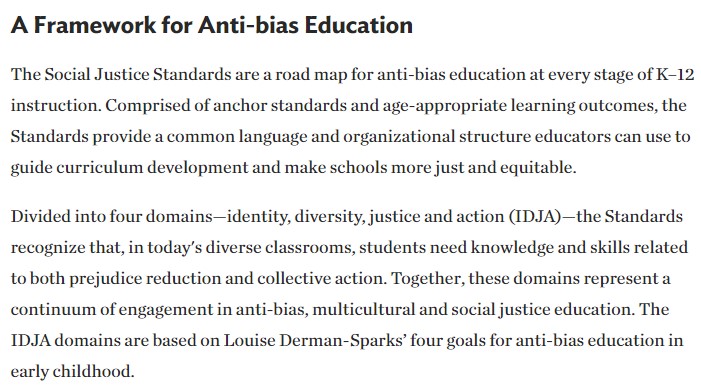
Lexington Public Schools teaches elementary students lessons about gender identity; provides training to teachers about toddlers who show racism
Incidents
A concerned community member provided Parents Defending Education with a presentation that appears to be training for district staff at Lexington Public Schools. The document is titled “Serious Talks and the LPS DEI Curriculum.” The presentation explains that the district began to “educate all students to be inclusive, racially literate, and culturally proficient” in September 2018.
One slide in the presentation is labeled “They’re not too young to talk about race!” This page includes a chart that states toddlers as young as a couple of years old can show signs of racism. This chart also appears to explain that white children at the age of five are more racist than children of other races and ethnicities: “By five, Black and Latinx children in research settings show no preferences toward their own groups compared to Whites; White children at this age remain strongly biased in favor of whiteness.”
The next page in the presentation appears to explain that children can be transgender and know their “gender identity” at four years old. The presentation then explains that children will use a false gender identity at the age of seven to appease adults: “By 7 years most children have gender constancy. They may go underground about gender distress to avoid distressing or displeasing the adults around them.”
The presentation later explains that transgender and gender identity issues are implemented into the curriculum of students as young as elementary school: “Windows and Mirrors Curriculum, including what it means to be gender nonconforming/gender expansive, the impacts of teasing, rumors, and bullying, recognizing discrimination, and more, developed and implemented K-5 in 2007.”
The “Serious Talks” curriculum specifically is explained to have six themes that include “Looking Ahead,” “Not Solved Yet,” “Oppression & Power,” “Privilege & Bias,” “Identity & Perspective,” and “Why This Work?” The description for “Identity & Perspective” states: “Aspects of identity, including who makes up a community, different colors of skin, gender norms, families, culture, religion; being proud of all the parts of you and understanding different perspectives.” The Boston Globe reported that parents could not opt their children out of the “Serious Talks” curriculum at Lexington Public Schools.
The presentation also explains that the district plans to “scale up to full PK-5 implementation of 12-16 lessons addressing Social Justice Standards of identity, diversity, justice, and action by 2025-2026.” The district’s presentation then links to Learning for Justice’s Social Justice Standards.
The presentation included a link to another document titled “Educator Statements on Serious Talks.” The document appears to be statements from teachers in Lexington Public Schools. A fourth grade teacher stated in this document that “the gender identity lesson in particular brought up SO much great conversation about expectations and stereotypes.” Another teacher who appears to have taught both second grade and fourth grade students discussed “they/them” pronouns:
I have found that students have also connected to the lessons where we introduce the term transgender. In both classes at least one student was able to share that they have a family member or someone they know or care about who is transgender. The introduction of the term and scaffolded conversation and lesson helps them to understand the identity rather than having to distill confusing/conflicting information for themselves. In particular, there are students in our elementary grades that use they/them pronouns, so the lesson helped students to understand the importance of using preferred pronouns.
The organization Learning for Justice has pushed for its “Social Justice Standards” to be adopted in schools throughout the country. The document for these standards includes goals to achieve for students. One goal is that “students will develop language and historical and cultural knowledge that affirm and accurately describe their membership in multiple identity groups.” Another goal appears to outright state that the purpose of the “Social Justice Standards” is to turn students into political activists: “Students will make principled decisions about when and how to take a stand against bias and injustice in their everyday lives and will do so despite negative peer or group pressure.”

Stay Informed
